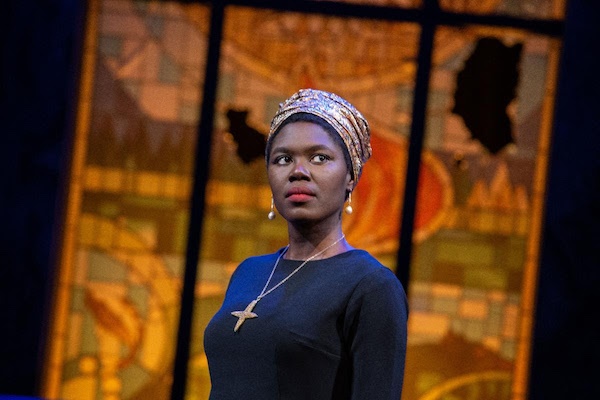Theater Review: “Nina Simone: Four Women” — Theater of Social Concern
By Erik Nikander
There’s much to admire and appreciate about this MRT production; but the play’s lack of a solid dramatic spine is a crippling problem.
Nina Simone: Four Women by Christina Ham. Directed by Kenneth L. Robertson. Staged by the Merrimack Repertory Theater (a co-production with Chicago’s Northlight Theatre) at 50 East Merrimack Street, Lowell, MA, through March 8.

Dionne Addai in a scene from the Merrimack Repertory Theatre production of Nina Simone: Four Women. Photo by Meg Moore.
A play with fire in its belly can be a wonderful thing. Of course, there’s nothing wrong with a playwright seeking to delight for entertainment’s sake, but the ambition to say something about the social and political issues bedeviling our world often leads to rich and compelling drama. The risk of this approach is obvious: if executed poorly, this sort of play can come off dry and preachy, to the point of boring audiences. Nina Simone: Four Women, a history play with music by Christine Ham, lands somewhere between these two extremes. Its successes are considerable, but its ardent commitment to change doesn’t always create satisfying drama.
It is September 1963 in Birmingham, Alabama, and four young black girls have just been senselessly murdered in a church bombing. Nina Simone (Dionne Addai), a musician whose career is on the rise, has stopped by the ruins, hoping to find the inspiration to write a politically charged song to help bring about the change that is so desperately needed. She is joined in the church by Sarah (Deanna Reed-Foster), a devout housekeeper; Sephronia (Ariel Richardson), a light-skinned black activist; and Sweet Thing (Alanna Lovely), a spirited prostitute. These four women all lead vastly different lives, but their chance meeting in this traumatic moment spurs them to seek common ground.
The focus on this struggle for understanding is one of the play’s greatest strengths. It highlights the fact that black women, despite sharing the same gender and race, are not a unified group — they reflect different backgrounds and life experiences. Society might classify them in a single mass, but they are still individuals with unique ways of viewing the world around them. Nina’s passion for music, for example, has shaped how she approaches social change, giving her an outlook that’s almost incompatible with Sarah’s more conservative, religious background. The women struggle to control their disdain for Sweet Thing’s job as a sex worker as well as their attitudes towars Sephronia’s lighter skin and the privilege that goes with it. Just as the real-life Simone did in her song “Four Women,” Ham creates a tapestry of characters who are familiar yet dissimilar.
The dramatist’s stumbling block is to find a way to weave its four characters’ stories into a narrative that generates dramatic momentum. Things seem promising when Nina and Sarah first get to know each other. Director Kenneth L. Roberson doesn’t rush things, which gives us time to understand the nuanced contours of these women’s circumstances. Right away, we get a sense of Nina’s worldly, cultured lifestyle and her unquenchable need to succeed. Sarah, on the other hand, is down-to-earth and unpretentious. She has the bearing (and speaks with the old-fashioned dialect) of a stock maid character, the sort that pioneering black actresses like Hattie McDaniel had no choice but to play if they wanted to make a living in Hollywood. Those celluloid housekeepers would often be relegated to the sidelines, used as simple comic relief. Reed-Foster builds on this cultural history by envisioning Sarah as a complex person with a rich emotional life. Weary but not hopeless, her resilient spirit is just the sort of wake-up call Nina needs.

Alanna Lovely, Deanna Reed-Foster, Dionne Addai, Ariel Richardson in a scene from the Merrimack Repertory Theatre production of Nina Simone: Four Women. Photo Meg Moore.
But when Sephronia and Sweet thing are introduced, the script starts running into some trouble. The show is only just over 90 minutes, and that doesn’t give Ham the time she needs to do justice to all the weighty, potentially traumatic topics that are brought up. Police brutality, class conflict, the merits of nonviolence in a social movement, the potential for art to enact social change, sexual violence — talk about all these issues is interspersed with biographical details about Nina Simone and musical numbers from her discography. And add, for good measure, a melodramatic pregnancy subplot that’s dropped almost as soon as it comes up! There’s simply too much crammed into too tight a package, too many ingredients for any of them to stand out as much as they should. The play swerves too quickly from topic to topic; the result is that it lacks a powerful dramatic through-line.
Dionne Addai’s performance as Simone is representative of the play as a whole. She fills the legendary songstress with revolutionary fervor. You never doubt the strength of the character’s convictions. At some moments, she’s unwaveringly fierce or tender and vulnerable; at others, she seems slightly stiff, distanced from the scene in a way that pulls us out of the moment. That said, she provides plenty of fire when Simone sings. The performer ached to sing songs that would make the audience sit up and listen carefully to the plight of black Americans; Addai achieves that goal with verve and skill. Accompanied by the versatile Daniel Riley on piano, she has the singing chops to do Simone’s wonderful body of work proud. Tunes like “To Be Young, Gifted and Black” and “Mississippi Goddam” are filled with emotional power.
Nina Simone: Four Women is a type of play that leaves you frustrated, in part because there’s so much to admire and appreciate about it. The production is well performed, solidly directed, and it makes good use of the MRT’s usual technical expertise. Yet the script falls short as a successful drama. Ham’s passion for Simone’s life and work is palpable, and the social problems her play tackles head-on are well worth discussing. But the script’s fatal lack of a solid dramatic spine holds it back. Its frazzled storytelling approach, along with inconsistent pacing, prevents its most gripping and poignant moments from resonating as deeply as they should.
Erik Nikander is a critic, playwright, and filmmaker based in the New England area. His film criticism can be read on Medium and his video reviews on a variety of topics can be viewed on Youtube at EWN Reviews.
